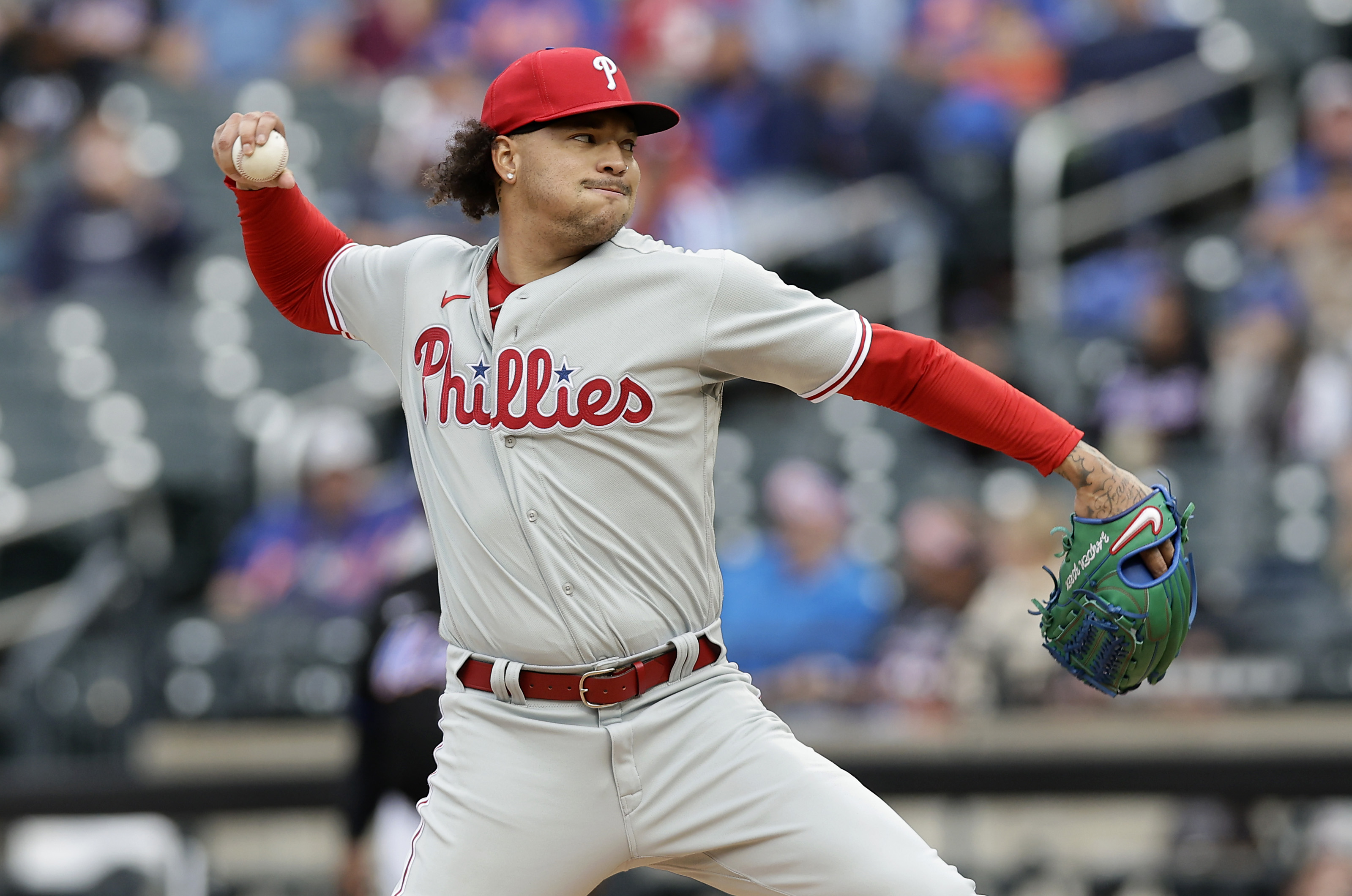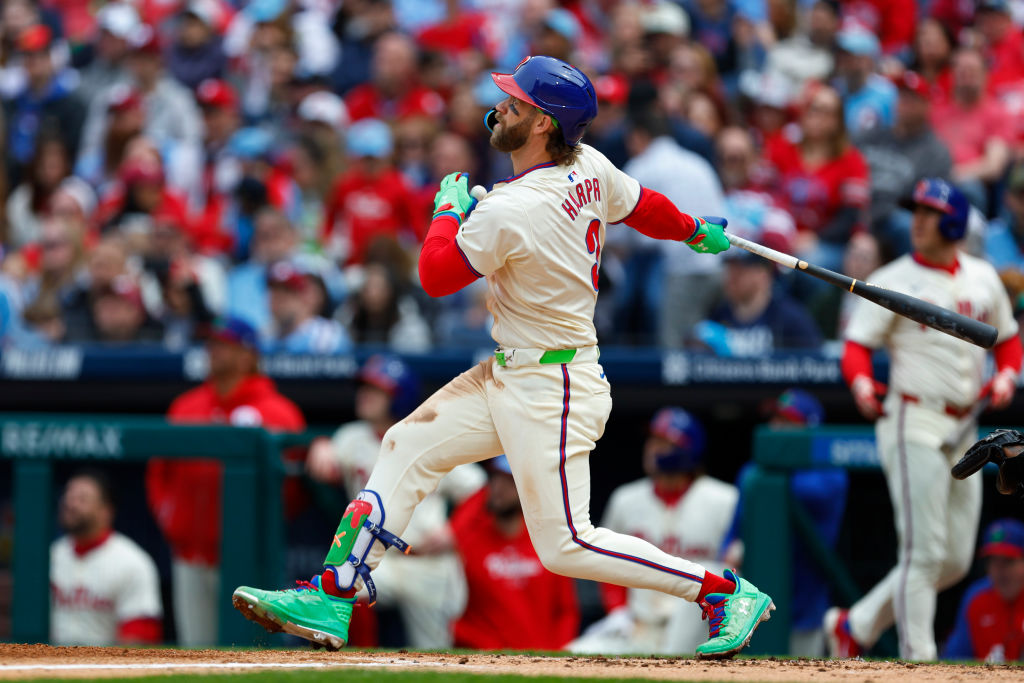Ken Rosenthal, who now no longer writes for Fox Sports, posted a long, juicy report Wednesday night on Facebook that involves the Phillies, Marlins, Giancarlo Stanton and Christian Yelich.
From Rosenthal:
"When I first heard the trade concept - heard it from three different sources - I thought, 'Whoa. Interesting.' It's interesting, all right. Damn interesting. And though the idea is extremely unlikely to advance - at least in its entirety - it is worthy of further discussion, simply because of the insight it provides into the two clubs involved.
"The concept was this: Marlins outfielders Giancarlo Stanton and Christian Yelich to the Phillies, with the Phillies absorbing the remainder of the two contracts - Stanton's monster deal through 2027 (he can opt out after ‘20) and Yelich's below-market deal through 2021.
"A potential $339.5 million, for those keeping score - a massive sum that surely would have limited the Marlins' prospect return if the conversations ever got started, which, according to sources, they did not. The Phils kicked around the concept internally, sources said."
Well, hot diggity. Let's take a look at this one.
Philadelphia Phillies
Complete coverage of the Fightin' Phils and their MLB rivals from NBC Sports Philadelphia.
Why it makes sense for the Marlins
The perpetually reloading Marlins are 41-46 with little shot at making the playoffs. They received impressive first halves from Marcell Ozuna, Justin Bour, Stanton and J.T. Realmuto and solid production from Yelich and Dee Gordon. And yet they're nine games out of the second wild-card spot.
If the Miami front office is being realistic, then it knows changes need to be made. Stanton stayed healthy in the first half, five other starting position players hit well, and they're still not a contender. If the realistic ceiling of a team with a lineup this deep is to hover around .500, then what's the point? Especially when you're not selling tickets, and especially with an ownership change coming in the near future.
If the Marlins trade Stanton, it wouldn't be because they doubt his abilities moving forward. It would be because of that gargantuan contract and the fact that Stanton has played more than 123 games just twice in his eight seasons.
Miami may also be dubious that Stanton will stay healthier as he ages. Few athletes do. Plus, he's such a big guy with so much swing-and-miss in his game that by, say 2024, this might be an Albert Pujols-like situation.
The contracts
Stanton signed a 13-year, $325 million contract prior to the 2015 season. The first three years of the deal are by far the cheapest. Here's how it plays out:
2015: $6.5M
2016: $9M
2017: $14.5M
2018: $25M
2019: $26M
2020: $26M
2021: $29M
2022: $29M
2023: $32M
2024: $32M
2025: $32M
2026: $29M
2027: $25M
2028: $25M club option ($10M buyout)
If that doesn't make your head spin ...
Stanton has a full no-trade clause, and he can opt out of this contract after the 2020 season. Though there's probably no chance he does opt out because he'll be 31 years old with eight guaranteed years and $244 million left on his deal. As sought-after as Stanton is, there's a near-zero-percent chance any other team gives him that deal at 31.
Trading Stanton would be such a typical Marlins move. Give a guy a huge, backloaded contract, pay him during the inexpensive years, trade him as soon as the annual salary skyrockets.
Yelich is on a much team-friendlier deal. He signed a seven-year deal prior to 2015 worth just under $50 million. From 2018-21, he's owed a total of $44.5 million. There's also a 2022 club option worth $15 million.
Yelich is the more appealing player even though Stanton is the bigger offensive difference-maker. Yelich is younger, has a better contract, has been healthier, and though he doesn't come close to matching Stanton's power, he's a more consistent offensive player.
Phillies' valuation of Stanton and Yelich
The Phillies' previous front office loved Stanton and probably would have overpaid for him in a trade.
The Phillies' current front office values raw power less and the hit tool more. It's why they've drafted Mickey Moniak and Adam Haseley - who both drew Yelich comparisons - in the first round the last two years. It's why you hear Matt Klentak and Andy MacPhail speak so often about "controlling the strike zone."
Yelich controls the strike zone. He's a .291 career hitter with a .376 OBP, and he's walked 70-plus times in two of his last three full seasons. He runs deep counts, is comfortable hitting with two strikes and though he'll whiff some, he doesn't run egregiously high strikeout totals.
Stanton does not control the strike zone as well. He hits the ball so incredibly hard when he makes contact that his balls in play fall for hits more often than they do for others, but he strikes out a lot and when he's cold, he's an easy out. Pitchers routinely attack Stanton with breaking balls on the outside corner. He's so big and his bat is so long that he often thinks he can reach that pitch, but he rarely does.
Any team would love to have Stanton, but you have to surround him with the right kind of team. If you have several undisciplined hitters in the lineup ahead of him or behind him, you're going to have many quick innings, many low-scoring nights and a lot of strikeouts. Of course, you're also going to have a lot of fun nights filled with home runs.
Why it makes sense for the Phillies
The Phillies' future payroll sheet is as blank as it gets. They owe Odubel Herrera $3.5 million in 2018, they're responsible for $2.5 million of Cole Hamels' deal and that is literally it.
Even when you account for arbitration raises (Freddy Galvis, Cesar Hernandez, Maikel Franco and Cameron Rupp), and the minimum-type salaries paid to Hector Neris, Jerad Eickhoff, Vince Velasquez, Aaron Nola, Tommy Joseph, Aaron Altherr and Andrew Knapp, they're looking at a payroll of approximately $15 million.
Thus, they could absorb and pay Stanton's bloated contract. They might not want that sort of commitment, but they're in the position to take it on.
We've heard a lot about the 2018 free-agent class, which includes two young stars in Bryce Harper and Manny Machado. If nothing materializes with this Marlins trade idea, the Phils could take their chances and hope to land Harper or Machado 17 months from now. But there's obviously no guarantee they land either player.
What might Phillies have to give up?
In Rosenthal's post, he writes that the Marlins would be wise to trade Stanton and Yelich in separate packages. It would allow them to recoup prospects for Yelich, which would be more difficult to do if they're attaching Stanton's contract to him.
If the Phillies did decide to make an offer for both players, they'd have to pay the salaries and also give up several young players.
Would something like Franco, Velasquez, another pitcher and two outfielders from the Herrera-Nick Williams-Dylan Cozens-Roman Quinn group get it done?
The Marlins would have to think long and hard about that sort of offer. They'd get younger and cheaper while adding major-league-ready pieces. They probably want pitching more than anything else.
This is all a worthwhile exercise because the Marlins have what many regard as the worst farm system in baseball and a way to go about fixing it. The Phillies have quantity of prospects but a barren major-league roster.
Rosenthal wouldn't have reported this if there wasn't a chance, however small, of something potentially happening. Remember, he was lambasted once upon a time for proposing the idea that the Phillies could trade Cliff Lee in their efforts to acquire Roy Halladay. How'd that one turn out?



